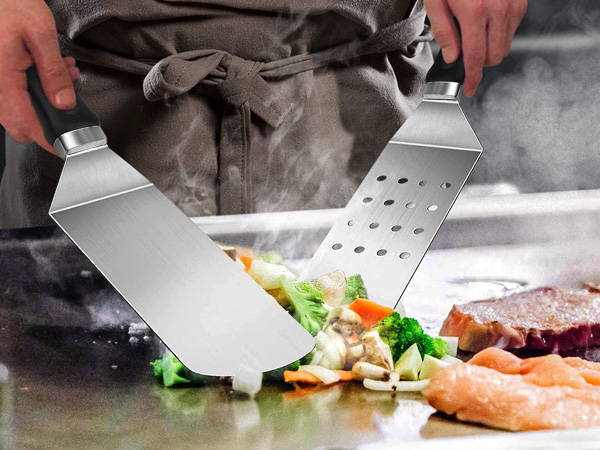Why Griddle Tools Are Heavier Than Kitchen Tools?
Written By James Morgan
For many barbecue enthusiasts, the allure of a perfectly grilled meal is irresistible. The sizzle, the aroma, and the taste all work together to create an unforgettable experience. But for those who dive deeper into the world of grilling, the tools used can make a world of difference. One common curiosity is why griddle tools are heavier than kitchen tools. This intriguing question opens up a discussion that goes far beyond the basics of grilling.
The difference in weight between griddle tools and standard kitchen tools is not merely cosmetic. It is a deliberate design choice that addresses the unique demands of outdoor cooking. Understanding these differences is key to appreciating the artistry behind barbecue tools.

The Role of Griddle Tools in Outdoor Cooking
Griddle tools are specifically crafted to handle the rigors of outdoor cooking. The heavier weight of these tools serves several purposes, all of which enhance the grilling experience. First and foremost, the heft of griddle tools improves their durability. When grilling outdoors, tools are often exposed to higher temperatures and more intense conditions than those found in a typical kitchen. A heavier tool is less likely to bend or warp under such conditions, ensuring long-lasting performance.
Additionally, the weight of griddle tools aids in effective heat transfer. A heavier spatula or scraper can conduct heat more efficiently, which is crucial when dealing with high-temperature grilling surfaces. This property not only aids in cooking but also in maintaining the griddle itself, as even heat distribution prevents hot spots that can damage the cooking surface.
Comparing Materials: Griddle vs. Kitchen Tools
Material choice is another factor contributing to why griddle tools are heavier than kitchen tools. Griddle tools are often made from materials like stainless steel or cast iron, known for their robustness and heat resistance. These materials are naturally heavier than those typically used for lighter kitchen tools, such as aluminum or plastic.
Stainless steel is a popular choice for griddle tools because of its resistance to corrosion and its excellent structural integrity. On the other hand, cast iron, while even heavier, offers unmatched heat retention properties, making it perfect for maintaining even cooking temperatures. This is particularly important for grilling enthusiasts who want to achieve consistent results with every meal.
The Design and Functionality of Griddle Tools
The design of griddle tools also plays a significant role in their weight. Tools like spatulas, scrapers, and tongs are constructed with reinforced handles and larger, sturdier blades to withstand the demands of outdoor cooking. The increased size and reinforced design add to the overall weight, but they also provide greater control and precision.
This design is essential for tasks like flipping burgers or turning delicate items like fish filets. The added weight allows for smoother, more controlled movements, reducing the risk of dropping food. For tips on avoiding such mishaps, check out our guide on how to avoid dropping food off your spatula.
Why Weight Matters in Grilling
The weight of griddle tools is not just about durability or heat retention; it's also about the overall grilling experience. Heavier tools provide a sense of stability and confidence, allowing grill masters to focus on their culinary creations rather than worrying about their tools' performance.
Moreover, the weight of griddle tools contributes to their versatility. They can handle a wide range of grilling tasks, from searing steaks to sauting vegetables. This versatility is a key reason why many barbecue enthusiasts consider investing in a quality set of griddle tools a must. For more on essential accessories, visit our guide on must-have accessories for griddles.
Maintaining Your Griddle Tools
Proper maintenance is crucial to preserving the performance and longevity of your griddle tools. Regular cleaning and proper storage can prevent rust and wear, ensuring that your tools remain as effective as the day you bought them. For more detailed advice, refer to our article on using a scraper for cleaning.
In conclusion, the reason griddle tools are heavier than kitchen tools is a combination of material choice, design considerations, and the unique requirements of outdoor cooking. For barbecue enthusiasts, understanding these differences is essential to achieving the best possible grilling results. Whether you're a seasoned grill master or just starting, investing in quality griddle tools can elevate your outdoor cooking experience to new heights.

FAQ Section
Why are griddle tools important for grilling?
Griddle tools are essential for grilling because they are designed to withstand high temperatures and outdoor conditions. Their durability and ability to transfer heat effectively make them indispensable for achieving consistent and delicious results on the griddle.
Are heavier griddle tools better?
Yes, heavier griddle tools often provide better performance. They offer greater stability and control, which is crucial for tasks like flipping and turning food. The extra weight also contributes to durability and effective heat transfer.
How should I maintain my griddle tools?
To maintain your griddle tools, regular cleaning and proper storage are key. Avoid leaving them exposed to the elements, and clean them thoroughly after each use to prevent rust and prolong their lifespan.
This article contains affiliate links. We may earn a commission at no extra cost to you.



